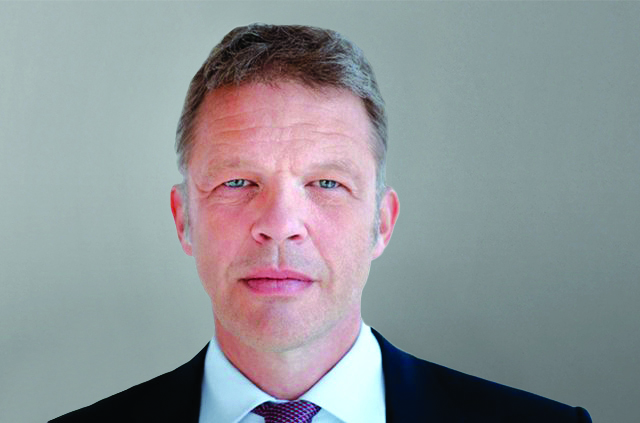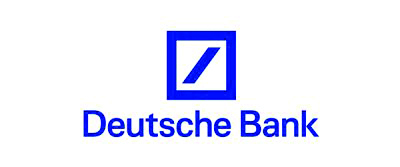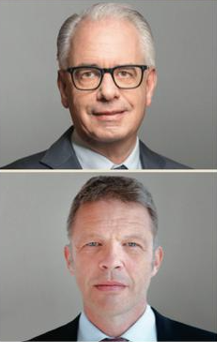Last month’s news of two systemically important financial institutions, Deutsche Bank and Credit Suisse, 19th-century titans in banking, being fined by the US Federal Reserve Board and the UK Prudential Regulatory Authority has become a wake-up call to urge a review of corporate governance and risk management strategies.
By Jennifer Paldano Goonewardane.

Ulrich Körner, Chief Executive Officer Credit Suisse.

Christian Sewing, CEO, Deutsche Bank.


Risk oversights and governance weaknesses have cost millions of dollars in recent weeks of some of the most prestigious financial institutions in the world. Deutsche Bank and Credit Swiss were the crème de la crème of the industry until they soiled their reputations with questionable dealings with clients who manipulated their internal structural weaknesses to deposit large sums of money with dubious origins without reportage to central banks. In a competitive, cutthroat industry, making profits at any cost has become the end-all and be-all of success and shareholder enrichment.
Regulatory authorities, notably in developed countries, have slapped hefty penalties, not once, but on several occasions, for a slew of breaches by internationally prestigious banks. Some of those banks with histories of over 100 years are facing penalties for failures on many fronts, including anti-money laundering failures, inadequate financial reporting, data breaches, risk management inadequacies, onboarding individuals with questionable records with connections to drug trafficking, human rights violations, sex trafficking, and other criminal activities, market manipulation, among many others.
Deutsche Bank is Germany’s biggest lender. But its reputation has been clouded by scandals, leading to millions of dollars in fines, estimated to be more than euro 14 billion. In July 2023, the German lender was fined $189 million by the Federal Reserve Board for “unsafe and unsound practices and violations of the Board’s 2015 and 2017 consent orders with Deutsche Bank New York relating to sanctions compliance and anti-money laundering controls”. What the Fed had described as “unsafe and unsound practices” involves the Bank’s relationship with the Estonian branch of the Denmark-based Danske Bank. Deutsche had processed over $267 billion in transactions between 2007 and 2015 for Danske Bank in Estonia, involving funds of “high-risk” customers in Russia and other countries to flow through the US financial system that has exposed the German lender’s inability to apply anti-money laundering internal controls and governance processes. Deutsche had failed to monitor the activities of Danske Estonia clients properly.
The latest fine is one of so many violations by the banks. Its Frankfurt headquarters has been famously raided in broad daylight by financial regulators and the Police over a series of misconduct charges. Its rag sheet flows quite long, from a 2012 multi-million euro VAT fraud involving employees to money laundering allegations and fines, including allegedly laundering money out of Russia from fraudulent dealings to being accused of rigging LIBOR interest rates between 2003 and 2007 and mis-selling mortgages and derivatives. The Bank also stood accused of involvement in foreign bribery schemes and conspiring in the precious metals market and had to pay $125 million in 2021 to avoid legal action. In 2020, Deutsche also paid $150 million for onboarding a disgraced sex trafficker in addition to paying another fine of $75 million to settle a lawsuit brought by the victims against the Bank alleging its facilitating role in sex trafficking and $200 million to the US Securities and Exchange Commission for electronic record-keeping failures. The Fed is pushing Deutsche to implement adequate financial controls lest it face further penalties. The German financial markets regulator BaFin has directed Deutsche Bank to improve its anti-money laundering safeguards and terrorist financing controls and comply with due diligence obligations.
A combined penalty of $388 million by US and UK regulators on Credit Suisse in July exposed the degree to which the Swiss lender, acquired by UBS in June 2023, was ready to bend the rules, a fact that got exposed as it faced collapse. Credit Suisse eventually built a reputation for the wrong reasons. Over the years, the Swiss lender got embroiled in many violations with regulators, famously for anti-money laundering failures. Credit Suisse was the banker to the ultra-rich, dictators, corrupt leaders, and drug rings. Some notable past scandals include a 2009 fine of $536 million for violating US sanctions against Iran, including Libya, Sudan, Burma, and Cuba, between 1995 and 2007.
In February 2022, it came to light that Credit Suisse had put away over $100 billion in total deposits of the ultra-rich with questionable reputations and earnings.
The latest fine imposed in July 2023 – $269 million by the Federal Reserve Board and £87 million by the UK Prudential Regulatory Authority cites “misconduct involved Credit Suisse’s unsafe and unsound counterparty credit risk management practices with its former counterparty, Archegos Capital Management”. From being the cornerstone of the Swiss economy, the reputed banker, in a bid to enlarge its bottom line, was ready to sacrifice regulatory compliance and overlook risks to lend extensively to Archegos, amounting to half of the bank’s equity that cost it $5.5 billion loss as the borrower collapsed. Archegos had borrowed extensively from banks such as Credit Suisse to purchase US and Chinese stocks from companies whose values dropped. The Swiss lender is accused of negligence on many levels – at the board and staff level, lapses at the board and executive level to gauge the client’s position and associated risks, and inexperience on the part of the staff for ignoring repeated violations of risk limits and acting in favor of their client over company interests.
From time to time in the recent past, as some of the well-funded financial institutions went into distress or became insolvent, regulators in the US, UK and Europe had to reassure their constituencies of well-capitalized, funded and resilient financial systems that could absorb such shocks and would not lead to a financial crisis. Of course, the events in the recent past, which have been exposed widely on social media platforms, have led to depositor apprehensions and added to the fears surrounding an already volatile global financial landscape.
Analysts think a series of missteps, principally changing its risk management strategy in another direction combined with a toxic culture, contributed to its downfall. Regular scrutiny and assessment of risk management mechanisms are also pivotal to strengthening relevancy.
In February 2022, it came to light that Credit Suisse had put away over $100 billion in total deposits of the ultra-rich with questionable reputations and earnings.
The latest fine imposed in July 2023 – $269 million by the Federal Reserve Board and £87 million by the UK Prudential Regulatory Authority cites “misconduct involved Credit Suisse’s unsafe and unsound counter-party credit risk management practices with its former counterparty, Archegos Capital Management”. From being the cornerstone of the Swiss economy, the reputed banker, in a bid to enlarge its bottom line, was ready to sacrifice regulatory compliance and overlook risks to lend extensively to Archegos, amounting to half of the bank’s equity that cost it $5.5 billion loss as the borrower collapsed. Archegos had borrowed extensively from banks such as Credit Suisse to purchase US and Chinese stocks from companies whose values dropped. The Swiss lender is accused of negligence on many levels – at the board and staff level, lapses at the board and executive level to gauge the client’s position and associated risks, and inexperience on the part of the staff for ignoring repeated violations of risk limits and acting in favor of their client over company interests.
From time to time in the recent past, as some of the well-funded financial institutions went into distress or became insolvent, regulators in the US, UK and Europe had to reassure their constituencies of well-capitalized, funded and resilient financial systems that could absorb such shocks and would not lead to a financial crisis. Of course, the events in the recent past, which have been exposed widely on social media platforms, have led to depositor apprehensions and added to the fears surrounding an already volatile global financial landscape.
Banking failures on many fronts are historical. Deutsche Bank and Credit Suisse are two high-profile institutions in the spotlight recently following the penalties. But going back, imposing fines for breaching regulatory commandments by influential international banks has been in practice. Given their history, the image and reputation these banks on look increasingly like a façade that hides deeper and shadier facilitation of crimes through the financial system. The question that begs a credible explanation is why banks fail to stick to the rules, notwithstanding their stature. One thing is clear. Commentators say that the two banks’ lack of adequate risk controls and leadership led to internal lapses in supervision, governance, and controls. The danger of facilitating unscrupulous financial dealings without proper monitoring mechanisms to assess the risks involved with a particular customer leads to them becoming accessories to criminal activities. Regulators consider banks the first line of defense against crimes committed through the financial system.
And this is where the conversation on following due diligence procedures comes in. Traditionally banks follow the Know Your Customer (KYC) approach. However, reports cite that US and UK regulators are concerned about banks’ failure to collect adequate customer information through a well-established filtering process represented by internal frameworks. The limitation of the traditional KYC approach is allowing high-risk customers to operate under the radar and manipulate the loopholes. In the UK, for instance, many banks still follow archaic structures that require improvement to perform due diligence on high-risk customers. The manual handling of high-risk customers’ due diligence processes makes the battle even more challenging. At the same time, some banks continue to operate with underdeveloped customer risk assessment frameworks. The penalties imposed on two global systemically important banks expose the dangers that even the best institutions that one would assume will have robust internal mechanisms in place are struggling to win the battle against ill-gotten money moving through legal, financial channels.
Analysts think a series of missteps, principally changing its risk management strategy in another direction combined with a toxic culture, contributed to its downfall. Regular scrutiny and assessment of risk management mechanisms are also pivotal to strengthening relevancy.
There is an ensuing discourse on the remedial course to overcome structural inadequacies. Some argue that in the case of Credit Suisse, the issue was a need for more competent individuals to manage the processes and assess the risks. Hence more layers of rules and controls are seen as something other than the answer. Others see the Swiss lender’s failure as coming on the heels of an overhaul in 2015 that compromised compliance and risk for growth and profitability, leading to aggressive risk-taking, financial losses, and misconduct. However, Credit Swiss by then had accumulated a history of scandals that had created a dent in its reputation, losing customers’ trust being the final nail in the coffin. Analysts think a series of missteps, principally changing its risk management strategy in another direction combined with a toxic culture, contributed to its downfall. Regular scrutiny and assessment of risk management mechanisms are also pivotal to strengthening relevancy. The direction of an organization’s culture is an essential indicator of the values the management pursues, which spills over to how it conducts business. Credit Suisse espoused a culture of risk tolerance when it prioritized growth and profits, leading to many compromises. Allocating more resources to managing risks is also cited as essential to prevent failures in the future. UBS bought Credit Suisse in June 2023.
Deutsche Bank is cleaning up its act with substantial investment in overhauling its due diligence processes by adding more resources to combat money laundering. In demonstrating its commitment to come clean and continue business, the Bank has announced that it has significantly invested in controls since 2019 and increased its global anti-financial crime team to over 2000. The German giant is trying to shed the shackles of its troubled past behind and turn over a new leaf to revive its bottom line. This time, it is pledging to go the extra mile to build its reputation with US and European regulators, a relationship that has long been dicey over the Bank’s repeated violations. Hopefully, its fall from grace is short-lived.






